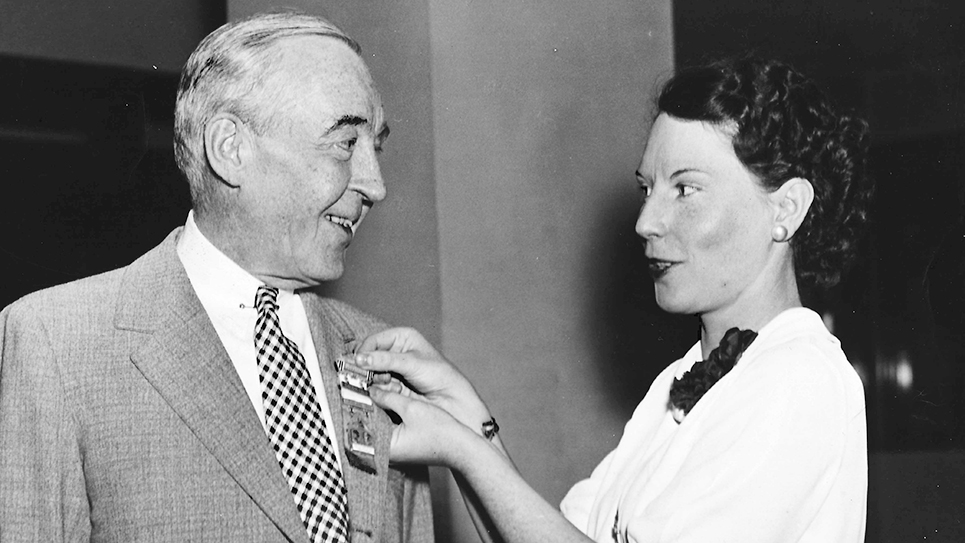Augustus O. Stanley of Kentucky
By Ray Hill
Every state conjures politicians who are highly controversial and two of Kentucky’s most polarizing political figures were Augustus Owsley Stanley and his rival, John Crepps Wickliffe Beckham. Both men were Democrats and could hold their own in any dispute. Stanley held every high office within the gift of the people of the Bluegrass State, being elected to the U.S. House of Representatives, the governorship, and finally the United States Senate.
Stanley was a powerful and gifted orator of the old school and routinely removed his necktie, coat and vest as he spoke. A. O. Stanley was an equally good storyteller at a time when there was no radio or television and the primary forms of communication with voters was through speaking, the mails, and newspapers. Stanley delighted audiences in the thousands with his masterful use of the English language and his vocabulary. Augustus O. Stanley was one of the most colorful politicians at the turn of the century.
The bitter campaign for governor between A. O. Stanley and Republican Edwin Morrow became legendary. Both were magnificent speakers and equally adept at hurling verbal bolts of insults and ridicule. The two men battered one another without mercy during the course of the campaign, with the result being the closest in Kentucky’s history.
Stanley was recognized as the leader of the progressive Democrats in Kentucky during his prime, while his nemesis J. W. C. Beckham headed the more conservative of the Bluegrass State’s Democrats. The two fought over almost everything, but they were miles apart on their stance on the issue of prohibition. Stanley was openly “wet” and drank that way. Beckham also enjoyed his liquor, but advocated for temperance, a stand Stanley ridiculed mercilessly. Stanley had been a reformer and was reputedly the principal author of the Clayton Anti-Trust Act. As a congressman, A. O. Stanley was a fierce foe of giant corporations and won a well-deserved reputation as one of the premier “trust-busters” in Congress. A. O. Stanley was a dogged investigator while in the House, and his probe into the American Tobacco Company led to its eventual dissolution. Likewise, Congressman Stanley led an 18-month investigation of the U.S. Steel Corporation; Stanley’s investigation caused the attorney general of the United States to go to court asking for the corporate giant to be dissolved. Both corporations were dissolved through decisions made by the Supreme Court of the United States.
Congressman Stanley’s battle with the American Tobacco Corporation began due to his outrage over the company reaching an agreement with British tobacco manufacturers to control the global market. For the many tobacco farmers inside his congressional district, it meant there were no other companies bidding to buy their product; they had no choice but to accept whatever price the American Tobacco Company cared to offer.
In speaking on the House floor, A. O. Stanley turned his formidable oratory on the U.S. Steel Corporation. “They [the individual consumers] are compelled to buy cooking utensils, stoves, tools, railroad rails, plows, trace chains. They cannot live, they cannot labor, they cannot die without paying tribute to the United States Steel Corporation. I do not care who buys their stocks, we must buy their wares, and we are entitled to buy them at a fair price. Before this committee gets through we will buy them at a fair price,” Stanley thundered.
Augustus O. Stanley served for 12 years in the House of Representatives. Stanley opted not to seek reelection to the House in 1914, instead running for the U.S. Senate. The congressman had daunting competition inside the Democratic primary from former Governor J. C. W. Beckham, who coveted a seat in the Senate as much as Stanley. Governor James McCreary also entered the primary, but the contest came down to Stanley and Beckham. Stanley lost the primary election to Beckham and rebounded by announcing he was running for governor in 1915.
Once again, A. O. Stanley encountered stiff opposition from the Beckham wing of Kentucky’s Democratic Party, but the former congressman won the nomination rather easily in a three-way race. Unlike some border states, Republicans were not altogether scarce. Kentucky Republicans had nominated Judge Edwin P. Morrow for governor, one of the most brilliant speakers in the state. While they pounded one another verbally, the two were friendly and toured the state together. Dr. Nicholas Burckel wrote in a study of Stanley’s career in the House of Representatives that the two gubernatorial contenders would relax with a bottle of bourbon after a hard day of campaigning. One of the most often told stories about Augustus O. Stanley involved his enjoyment of adult beverages and his becoming sick just before he was to speak. Stanley vomited during Morrow’s speech. Rising to talk, Stanley asked the audience to excuse him and said, “That just goes to show you what I have been saying all over Kentucky. Ed Morrow makes me plain sick to my stomach.”
The contest became the closest in the history of the Bluegrass State with Stanley winning by less than 500 votes.
Some Kentucky historians credit A. O. Stanley’s administration as governor as one of the most progressive in the state’s history. One of his most significant accomplishments as Kentucky’s chief executive was reorganizing the administration of the University of Kentucky. When the Kentucky legislature passed a bill during the First World War prohibiting the teaching of German in Bluegrass State schools, Governor Stanley vetoed it, despite the intense reaction of many Kentuckians. “We are at war with an armed despotism, not a language,” Stanley retorted.
Augustus O. Stanley did not complete his term as governor. U.S. Senator Ollie M. James died unexpectedly on August 18, 1918, despite having a variety of ailments, including kidney disease. James was already the Democratic nominee to succeed himself in the U.S. Senate when he died. Kentucky’s Democratic State Executive Committee met to name a new nominee, and finally, A. O. Stanley’s long-cherished desire to sit in the Senate of the United States was one step closer to reality. Governor Stanley became the Democratic nominee for the Senate in the 1918 election. Even Senator J. C. W. Beckham supported Stanley, as he had fully expected the governor to challenge him when his own seat was up for election in 1920.
Senator Stanley loved his job and worked hard at it. When he sought reelection in 1924, he encountered several obstacles; Senator Beckham had been defeated by a Republican in 1920, and the Ku Klux Klan was becoming a powerful force in Bluegrass State politics. The KKK was opposed to Senator A. O. Stanley, as well as those voters who favored temperance. Stanley had the additional handicap of being undermined by Governor William J. Fields, a fellow Democrat. Senator Stanley’s defeat had much to do with his opposition to prohibition. Stanley lost the general election to GOP nominee Frederic Sackett, giving the Bluegrass State two GOP senators for the first time.
Hoping to reunite Kentucky’s fractured Democratic Party, the former senator backed his former rival J. C. W. Beckham, who was attempting a political comeback of his own by seeking the governorship in 1927. Beckham lost to Republican Flem Sampson, which dimmed A. O. Stanley’s hopes for a comeback of his own.
Following his defeat, A. O. Stanley started a law practice and divided his time between Kentucky and Washington, D.C. In May 1930, President Herbert Hoover appointed former Senator Stanley to the International Joint Boundary Commission, which was charged with settling any water boundary disputes between the United States and its neighbor to the north, Canada. Although a Democrat, Stanley’s appointment came at the hands of a Republican. Stanley gave up his law practice and concentrated on his duties as a member of the commission, which provided a comfortable salary. So, too, did Stanley give up his notion of attempting to run for the U.S. Senate again in 1930. Stanley lived primarily in Washington, D.C. from 1930 until his death. Former Governor Stanley chaired the commission in 1933 and was proud of his service.
Although he resided in Washington, Stanley traveled back to Kentucky on occasion. The former governor attended a meeting in Louisville when he provided half the funds needed for a “Bookmobile” for Franklin County; the other half of the money was donated by the Farmers Bank & Trust Company of Frankfort. “Books are an essential part of a nation’s capital assets,” Stanley told the group, quoting Thomas Jefferson and Thomas Macauley, the prominent British historian. Jefferson had said, “I could not live without books.” The quote from Macauley was, “I had rather be a beggar with a garret full of books than be a king who could not read.” At the time Stanley spoke, he was 86 years old.
The gift for the $3,000 Bookmobile had been prompted by a telephone call to the former governor by the president of the bank, Pat Sullivan. “I telephoned him and reminded him he still had some money lying in our bank,” Sullivan recalled. The banker then wondered if Stanley might make a contribution toward purcha sing the bookmobile. “I can’t think of a better way to use it,” Stanley replied immediately.
Stanley was reappointed by successive presidents and did not leave office until 1954, and then only because of efforts by the Eisenhower Administration to push him out of office. The seat A. O. Stanley held on the commission paid $10,600 (more than $120,000 today) and doubtless the Eisenhower Administration wanted to give that plum to a deserving Republican. Stanley had refused to be budged until he announced in January 1954 that he would resign his seat on the International Joint Commission effective February 1, 1954. The former governor told a reporter it was evident “the administration is hard up for jobs.”
One Republican who had thought he was deserving of Stanley’s seat on the International Joint Commission was former U.S. Senator Owen Brewster of Maine. Brewster had lost the GOP primary in 1952 and had been searching for an appointment, summoning support from former colleagues. Brewster laid siege to the Eisenhower Administration and, for a time, he lobbied hard to replace Stanley. Brewster’s determination in replacing him likely had the effect of allowing the stubborn former governor to hold his sinecure even longer, especially as Secretary of State John Foster Dulles was unenthused about the prospect of giving Owen Brewster any kind of appointment. Indiana’s U.S. senators, Homer Capehart and William E. Jenner, had already endorsed yet another former senator, 78-year-old Raymond E. Willis, to fill the vacancy caused by Stanley’s resignation.
Stanley was quite nearly 87 years old at the time. The Lexington Herald published an editorial commending the old warrior for his long service on the International Joint Boundary Commission, recalling the former governor who had “thrilled” thousands of Kentuckians with an “eloquence that surpassed the masters even in a commonwealth where oratory once was always in flower. . .” At the time of his resignation as a member of the commission, A. O. Stanley was still serving as the chair. The Herald noted Stanley was still very active at his advanced age and “remained keenly alert and daily proficient in performing the duties of the commission which he heads.”
Former senator A. O. Stanley died at his home in Washington, D.C., on August 12, 1958, at the age of 91. Stanley had been in declining health and died from complications resulting from a heavy cold. As befitting a one-time governor of Kentucky, his body was put on a train bound for Frankfort, where he would lie in state at the Capitol. Stanley’s casket was draped with the state flag while two white-helmeted members of Kentucky’s National Guard stood watch nearby. The shifts changed every two hours while the former governor’s body lay in the Capitol Rotunda.
Stanley’s earthly remains were buried in a grassy knoll in Frankfort Cemetery, which overlooked the Kentucky River, the City of Frankfort, and the State Capitol where he had presided as governor decades before.
© 2025 Ray Hill







